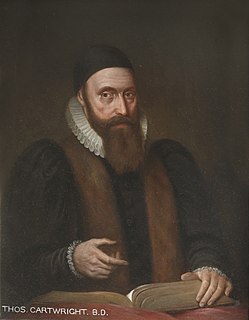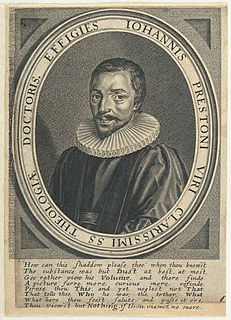This article needs additional citations for verification .(May 2021) (Learn how and when to remove this template message) |
This article needs additional citations for verification .(May 2021) (Learn how and when to remove this template message) |
Fenn was matriculated as sizar of Queens' College, Cambridge, on 12 November 1568, and graduated B.A. in 1573. He migrated to Peterhouse, and graduated M.A. in 1576. [1] In the same year he began his ministry at Northampton, and at once got into trouble for his nonconformity, and was committed to gaol. The inhabitants of Northampton petitioned Queen Elizabeth for his release, giving him a high character as a preacher and a loyal subject.
On 21 Feb. 1578 he succeeded Anthony Fletcher as vicar of Holy Trinity, Coventry, and became a prominent man in the party headed by Thomas Cartwright (1535–1603). At the request of the London puritans he accompanied the Earl of Leicester to represent their grievances to the queen. On the issue of Whitgift's three articles (1583), he refused to subscribe. He was cited to Lambeth (1584), and suspended. An account of his examination is given by Brook, from Roger Morrice's manuscript. His place was taken by ‘one Griffen, a Welchman,’ between whom and Fenn, according to the manuscript city annals, there was ‘a great contention’ for the vicarage in 1584 or 1585. Fenn was restored to his vicarage shortly after 14 July 1585, through the intercession of Leicester. But in 1590 he was again suspended, owing to the active part which he took in the ‘associations’ of the Warwickshire puritan divines, was committed to the Fleet by the high commission, with Cartwright and others, and, refusing the purgation by oath, was deprived.
His successor, Richard Eaton, was instituted on 12 Jan. 1591. On 13 May Fenn and his companions were brought before the Star-chamber. Articles, dealing mainly with their ‘book of discipline,’ were exhibited against them. They denied that in their ‘associations’ they exercised any jurisdiction, or meddled with sedition. Fenn ‘seemed more stiff than Cartwright.’ The Star-chamber remanded them without bail. James VI of Scotland interceded (12 June) for their release; on 4 Dec. they petitioned for bail; Fenn's signature stands second in the list, immediately after Cartwright's. In April 1592 they again petitioned for release, this time successfully. (Leicester's letter of thanks is dated 21 May.)
Fenn returned to Coventry, and resumed his ministry, probably preaching only on week-days. On 24 April 1624 ‘Mr. Humphrey Fenn, preacher,’ was appointed to the Sunday lectureship at St. John the Baptist's (Bablake). This was a new lectureship; the church, which had been in ruins, was repaired in 1608, and a week-day lectureship established in favour of John Oxenbridge. In 1626 or soon after ‘old Mr. Fenn’ joined with the mayor and leading citizens in inviting Samuel Clarke (1599–1683), the martyrologist, to become a lecturer at Coventry. This is the last notice of Fenn. Tong says that he ‘spent above forty years’ with the Coventry people; we must correct this to ‘above fifty,’ even if we deduct his enforced absences. He died early in 1633–4, and was buried on 8 Feb. in Holy Trinity churchyard, Coventry. He seems to have had a son and grandson of the same name.
His will, made in 1631, was prefaced by ‘so full and so open a protestation against the hierarchy and the ceremonies, that the prelatical party would not suffer it to be put among the records of the court when the will was tendred[ check spelling ] to be proved’ (Clark, in Life of Julines Herring). On 21 Feb. 1634 a copy of the introduction to the will of ‘Humphrey Fen the eldest’ was received by Archbishop Laud from the bishop of Coventry and Lichfield. This preamble (only) was printed as ‘The Last Will and Testament with the Profession of Faith of Humphrey Fenn,’ &c., 1641, sm. 8vo (no place of printing).

Thomas Cartwright was an English Puritan churchman.

Dudley Fenner was an English puritan divine. He helped popularise Ramist logic in the English language. Fenner was also one of the first theologians to use the term "covenant of works" to describe God's relationship with Adam in the Book of Genesis.

Thomas Goodwin, known as "the Elder", was an English Puritan theologian and preacher, and an important leader of religious Independents. He served as chaplain to Oliver Cromwell, and was imposed by Parliament as President of Magdalen College, Oxford, in 1650. Christopher Hill places Goodwin in the "main stream of Puritan thought".

Laurence Chaderton was an English Puritan divine, the first Master of Emmanuel College, Cambridge and one of the translators of the King James Version of the Bible.
William Fuller was dean of Ely and later dean of Durham. He was in serious trouble with parishioners and Parliament during the early 1640s.

John Preston (1587–1628) was an Anglican minister and master of Emmanuel College, Cambridge.
Stephen Egerton (1555?-1621?) was an English priest, a leading Puritan preacher of his time, who was also active in agitating for reform of the Church of England.
Perceval Wiburn or Wyburn (Percival) (1533?-1606?) was an English clergyman, a Marian exile, suspected nonconformist and Puritan, and polemical opponent of Robert Parsons.

William Jenkyn (1613–1685) was an English clergyman, imprisoned during the Interregnum for his part in the 'Presbyterian plot' of Christopher Love, ejected minister in 1662, and imprisoned at the end of his life for nonconformity.
Edward Dering was an English priest and academic, known as a classical scholar, controversialist, supporter of Thomas Cartwright, and fiery preacher against his fellow clergy. Constantly in trouble from 1570, he was not found to be nonconformist in doctrine, but was an opponent of the episcopate.

Samuel Clarke was an English clergyman and significant Puritan biographer.
Richard Howland (1540–1600) was an English churchman and academic, Master of Magdalene College, Cambridge, and of St John's College, Cambridge, and bishop of Peterborough.
John Stockwood was an English clergyman, preacher, translator of Protestant texts and school-master.
John Shawe or Shaw (1608–1672) was an English Puritan minister, an influential preacher in the north of England during the Interregnum.

The reign of Elizabeth I of England, from 1558 to 1603, saw the start of the Puritan movement in England, its clash with the authorities of the Church of England, and its temporarily effective suppression as a political movement in the 1590s by judicial means. This of course led to the further alienation of Anglicans and Puritans from one another in the 17th century during the reign of King James (1603-1625) and the reign of King Charles I (1625-1649), that eventually brought about the English Civil War (1642-1651), the brief rule of the Puritan Lord Protector of England Oliver Cromwell (1653-1658), the English Commonwealth (1649-1660), and as a result the political, religious, and civil liberty that is celebrated today in all English speaking countries.
Giles Wigginton was an English clergyman who became a fringe religious activist towards the end of the sixteenth century.
Nathaniel Wanley was an English clergyman and writer, known for The Wonders of the Little World.
Thomas Barbar, was an English divine.
Samuel Winter DD (1603–1666) was an English clergyman and academic, who became Provost of Trinity College Dublin.
Julines Herring (1582–1644/5) was a Puritan clergyman within the Church of England who served in Derbyshire and at Shrewsbury. Ejected from his positions for nonconformity, he became a minister serving the English-speaking community in the Netherlands. He was a staunch proponent of Presbyterianism and an opponent of separatism.
![]() This article incorporates text from a publication now in the public domain : "Fenn, Humphrey". Dictionary of National Biography . London: Smith, Elder & Co. 1885–1900.
This article incorporates text from a publication now in the public domain : "Fenn, Humphrey". Dictionary of National Biography . London: Smith, Elder & Co. 1885–1900.